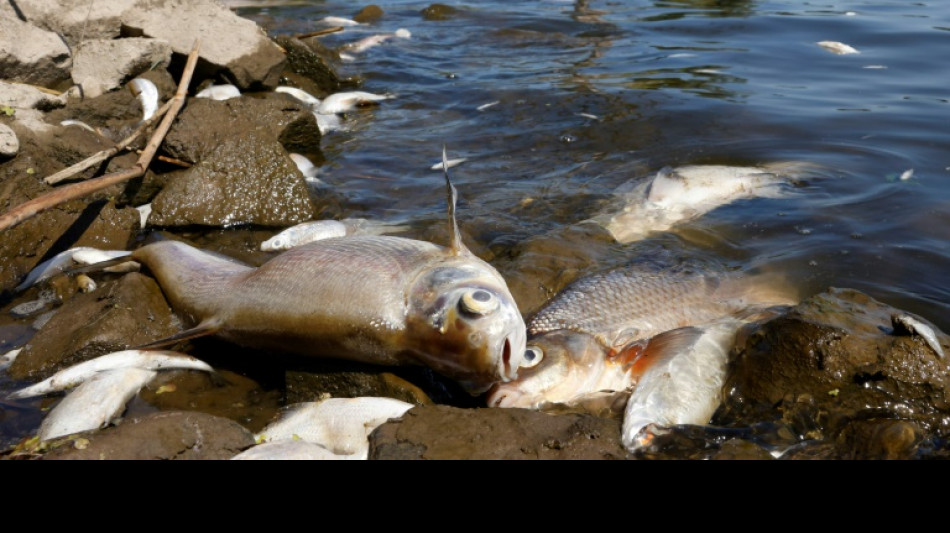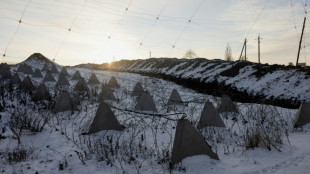
-
 'Everything was removed': Gambians share pain with FGM ban in balance
'Everything was removed': Gambians share pain with FGM ban in balance
-
Kim Jong Un opens rare party congress in North Korea

-
 Ex-Philippine leader Duterte faces pre-trial ICC hearing
Ex-Philippine leader Duterte faces pre-trial ICC hearing
-
Japanese star Sakamoto 'frustrated' at missing Olympic skating gold

-
 Japan inflation eases in welcome news for Takaichi
Japan inflation eases in welcome news for Takaichi
-
FIFA to lead $75m Palestinian soccer rebuilding fund

-
 Chicago Bears take key step in proposed Indiana stadium move
Chicago Bears take key step in proposed Indiana stadium move
-
Liu captures Olympic figure skating gold as US seal hockey glory

-
 North Korea opens key party congress
North Korea opens key party congress
-
Los Angeles sues Roblox over child exploitation claim

-
 Golden Liu puts US women back on top of Olympic women's figure skating
Golden Liu puts US women back on top of Olympic women's figure skating
-
Hodgkinson sets women's 800m world indoor record

-
 USA's Alysa Liu wins Olympic women's figure skating gold
USA's Alysa Liu wins Olympic women's figure skating gold
-
Man Utd cruise into Women's Champions League quarters

-
 Gu reaches Olympic halfpipe final after horror crash mars qualifiers
Gu reaches Olympic halfpipe final after horror crash mars qualifiers
-
Keller overtime strike gives USA Olympic women's ice hockey gold

-
 NASA delivers harsh assessment of botched Boeing Starliner test flight
NASA delivers harsh assessment of botched Boeing Starliner test flight
-
US Fed Governor Miran scales back call for rate cuts this year

-
 Gu qualifies for Olympic halfpipe final marred by horror crash
Gu qualifies for Olympic halfpipe final marred by horror crash
-
Trump issues Iran with ultimatum as US ramps up military presence

-
 Peru's brand-new president under fire for child sex comments
Peru's brand-new president under fire for child sex comments
-
UK police hold ex-prince Andrew for hours in unprecedented blow

-
 Former Olympic freeski halfpipe champion Sharpe crashes heavily
Former Olympic freeski halfpipe champion Sharpe crashes heavily
-
Former Olympic champion Sharpe suffers heavy halfpipe crash

-
 Belarus says US failed to issue visas for 'Board of Peace' meeting
Belarus says US failed to issue visas for 'Board of Peace' meeting
-
Forest boss Pereira makes perfect start with Fenerbahce rout in Europa play-offs

-
 Alcaraz fights back to book last four berth in Qatar
Alcaraz fights back to book last four berth in Qatar
-
England captain Itoje warns of 'corrosive' social media after abuse of Ireland's Edogbo

-
 War-weary Sudanese celebrate as Ramadan returns to Khartoum
War-weary Sudanese celebrate as Ramadan returns to Khartoum
-
Townsend expects recalled Scotland duo to shine in Six Nations clash with Wales

-
 Peru's new president under fire for child sex comments
Peru's new president under fire for child sex comments
-
UK king opens London fashion week despite brother's arrest

-
 Belarus frees opposition politician Statkevich
Belarus frees opposition politician Statkevich
-
Striking Argentine workers slow down Buenos Aires in protest over labor reforms

-
 Starlink loss a blow to Russian forces in Ukraine: experts
Starlink loss a blow to Russian forces in Ukraine: experts
-
UN's Sudan probe finds 'hallmarks of genocide' in El-Fasher

-
 Belarus frees opposition politician Statkevich: wife
Belarus frees opposition politician Statkevich: wife
-
Rocket re-entry pollution measured in atmosphere for first time

-
 Airbus ready to build two new European fighters if countries want
Airbus ready to build two new European fighters if countries want
-
Canada makes push to attract skilled migrants, including for defence

-
 US threatens to leave IEA if net zero focus remains
US threatens to leave IEA if net zero focus remains
-
Walmart outlines big AI ambitions as it reports mixed results

-
 Trump kicks off his 'Board of Peace,' as war clouds loom on Iran
Trump kicks off his 'Board of Peace,' as war clouds loom on Iran
-
UK pubs to stay open late if home nations reach World Cup knockouts

-
 TotalEnergies in high-stakes French trial over climate change
TotalEnergies in high-stakes French trial over climate change
-
Bosnia probes fascist salutes at Croatian singer's concert

-
 US and Israel issue dire warnings to Iran alongside US military buildup
US and Israel issue dire warnings to Iran alongside US military buildup
-
British public cheer Andrew's arrest with a smile and relief

-
 Argentine workers go on strike to protest Milei's labor reforms
Argentine workers go on strike to protest Milei's labor reforms
-
Nakai targets Olympic skating upset as 'skimo' makes debut


'Dead fish everywhere' in German-Polish river after feared chemical waste dump
Thousands of fish have washed up dead on the Oder river running through Germany and Poland, sparking warnings of an environmental disaster as residents are urged to stay away from the water.
The fish floating by the German banks near the eastern town of Schwedt are believed to have washed upstream from Poland where first reports of mass fish deaths were made by locals and anglers as early as on July 28.
German officials accused Polish authorities of failing to inform them about the deaths, and were taken by surprise when the wave of lifeless fish came floating into view.
In Poland, the government has also come under heavy criticism for failing to take swift action.
Almost two weeks after the first dead fish appeared floating by Polish villages, Polish Prime Minister Mateusz Morawiecki said on Friday that "everyone had initially thought that it was a local problem".
But he admitted that the "scale of the disaster is very large, sufficiently large to say that the Oder will need years to recover its natural state."
"Probably enormous quantities of chemical waste was dumped into the river in full knowledge of the risk and consequences," added the Polish leader, as German Environment Minister Steffi Lemke urged a comprehensive probe into what she called a brewing "environmental disaster".
- 'Atypical' -
Standing by the riverbank, Michael Tautenhahn, deputy chief of Germany's Lower Oder Valley National Park, looked in dismay at the river on the German-Polish border.
"We are standing on the German side -- we have dead fish everywhere," he told AFP.
"I am deeply shocked... I have the feeling that I'm seeing decades of work lying in ruins here. I see our livelihood, the water -- that's our life," he said, noting that it's not just fish that have died, but also mussels and likely countless other water creatures.
"It's just the tip of the iceberg."
The Oder has over the last years been known as a relatively clean river, and 40 domestic species of fish make their home in the waterway.
But now, lifeless fish -- some as small as a few centimetres, others reaching 30-40 cm -- can be seen across the river. Occasionally, those still struggling to pull through can be seen flipping up in the water, seemingly gasping for air.
Officials believe that the fish are likely to have been poisoned.
"This fish death is atypical," said Axel Vogel, environment minister for Brandenburg state, estimating that "undoubtedly tonnes" of fish have died.
Fish death is often caused by the distortion of oxygen levels when water levels are too low, he explained.
"But we have completely different test results, namely that we have had increased oxygen level in the river for several days, and that indicates that a foreign substance has been introduced that has led to this," he said.
Tests are ongoing in Germany to establish the substance that may have led to the deaths.
Early reports had suggested indications of extremely high levels of mercury. But another batch of preliminary results released on Friday evening showed unusually high levels of salt.
Authorities said they were unconclusive, and that further test results on heavy metals and mercury were pending.
In Poland, prosecutors have also begun investigating after authorities came under fire over what critics said was a sluggish response to a disaster.
Tautenhahn said the disaster would likely carry consequences for years to come.
"If it is quicksilver, then it will also stay here for a long time," he said, noting that mercury does not disintegrate but would then remain in the sediments.
D.Kaufman--AMWN


